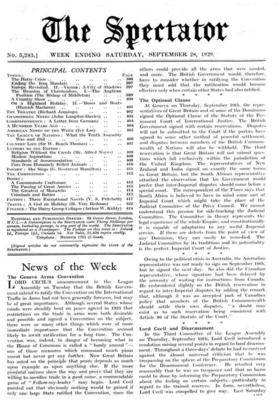News of the Week
The Geneva Arms Convention TORD CECIL'S announcement in the League Assembly on Tuesday that the British Govern- ment intend to ratify the Convention on the InternatiOnal Traffic in Arms had riot been generally foreseen, but may be of great importance. Although several States whose minds were steadily bent on peace agreed in 1925 that restrictions on the trade in arms were both desirable and possible and signed a Convention on the subject, there were so many other things which were of more immediate importance that the Convention seemed likely to await--ratification for a long time. The Con- vention was, indeed, - in danger of becoming what in the House of Coml.-Iona is called a " hardy annual "- one of those measures which command much pious assent but never get any further.- Now -Great Britain has acted-on the principle that peace depends as mush Upon exaniPle as upon anything. else.— If the More pOwerfurnations shoW the Way and prose lhai they are willing to kierifice trade-in 'a good, cause, a- cotninendable game of " Followrmy:leader ". may begin. Lord Cecil pointed out that obviously nothing would be gained if only one large State ratified the Convention, since the others could provide all the arms that were needed, and more. _ The British Government would,, therefore, have to consider whether iq ratifying the Convention they must . add that the ratification would become effective only when certain other States had also ratified.
* *


































